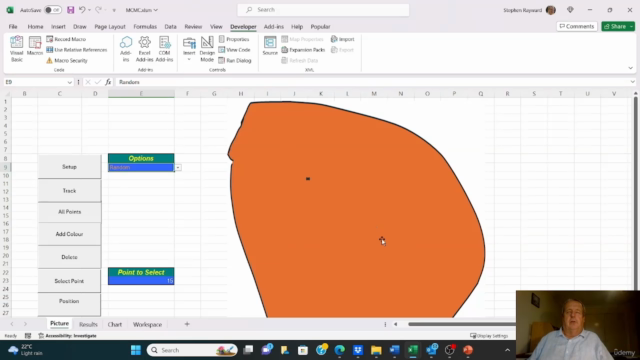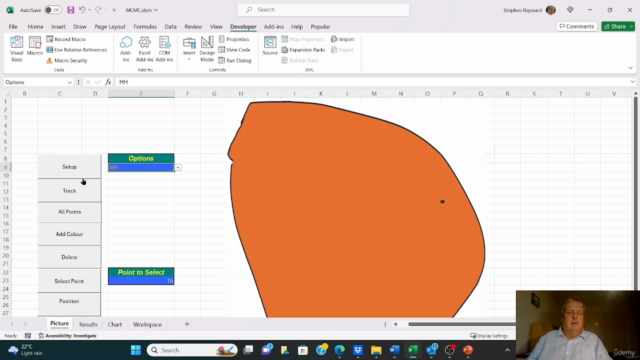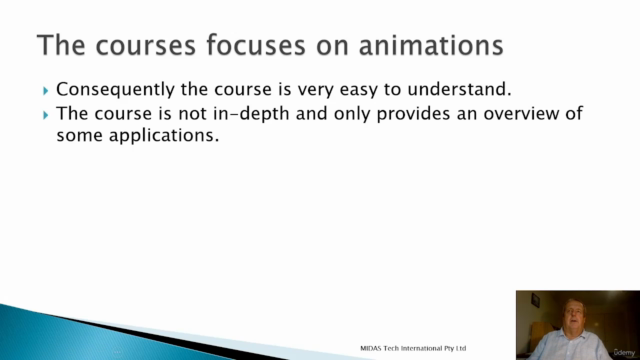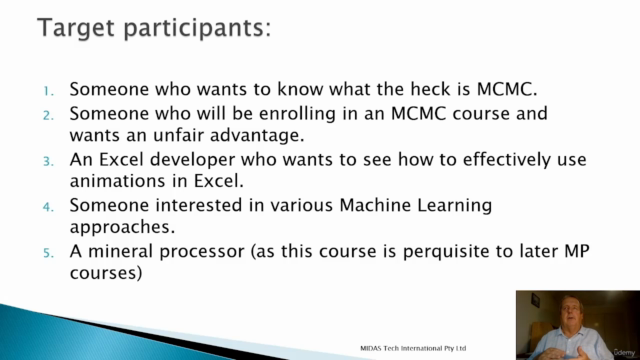Geometric Introduction to Markov Chain Monte Carlo

Why take this course?
It seems you've provided an outline for a comprehensive course on Markov Chain Monte Carlo (MCMC) methods, specifically focusing on Gibbs Sampling and the Metropolis-Hastings (MH) algorithm. The course is designed to help students understand the foundational concepts of MCMC, with a practical focus on applying these methods to track points within a geometric space, calculate means and variances, and understand the transition from non-conditional to conditional probability functions using MH.
Here's a summary of the course content based on your outline:
SECTION 1: INTRO TO MCMC Methods:
- Introduction to Statistical Modelling
- Introduction to Bayesian and Frequentist Approaches
- Introduction to MCMC Methods
- Overview of MCMC Methods
SECTION 2: METHODS (GIBBS SAMPLING):
- Basics of Gibbs Sampling
- Detailed Explanation of Gibbs Sampling
- Implementation and VBA Code for Gibbs Sampling
- Practical Application of Gibbs Sampling to a Collection of Points
- Gibbs Sampling Applied to a Geometric Space (Particles within the geometric shape)
- Calculating Mean and Variance using Gibbs Sampling
SECTION 3: METHODS (METROPOLIS-HASTINGS):
- Basics of Metropolis-Hastings Algorithm
- Detailed Explanation of the Metropolis-Hastings Algorithm
- Implementation and VBA Code for Metropolis-Hastings Algorithm
- Practical Application of MH to a Collection of Points
- Calculating Mean and Variance using MH Algorithm
- Metropolis-Hastings Applied to a Geometric Space (Tracking particles within the geometric shape) SECTION 4: CONCLUSIONS:
- Summary of MCMC Methods Learnt
- Advantages for Students Studying MCMC in University Courses
SECTION 5: ADDITIONAL LECTURES & RELATED COURSES UNDER DEVELOPMENT:
-
Applications of MCMC Methods (Geometric Probability, Comminution, Mineralogy, Games like Mastermind)
-
Proof of Metropolis-Hastings Algorithm (Conceptual proof for a 2-value problem; Advanced Mathematics Guidance)
-
Additional Lectures (Discussion on additional applications, mathematical basis, and related courses under development) Throughout this course:
-
Students will learn the foundations of MCMC and gain a deep understanding of these methods.
-
Practical examples and code (VBA code examples given for both Gibbs Sampling and Metropolis-Hastings Algorithm).
-
Discussions on how to apply these methods to new problems. The course outline you provided is well structured, starting with the basic concepts and progressively moving towards more advanced topics such as proofs and practical applications. This approach helps students incrementally as they become more comfortable with the more complex aspects of MCMC methods like MH algorithm. Your course appears to be designed for a student who already has some background in statistical modelling, probability theory, and computational techniques. It aims to bridge the gap between theoretical knowledge and practical applications using advanced computational methods such as MCMC. If you're looking to teach or learn from such a course, it seems like it would provide an excellent foundation and understanding of the subject matter.
Course Gallery




Loading charts...